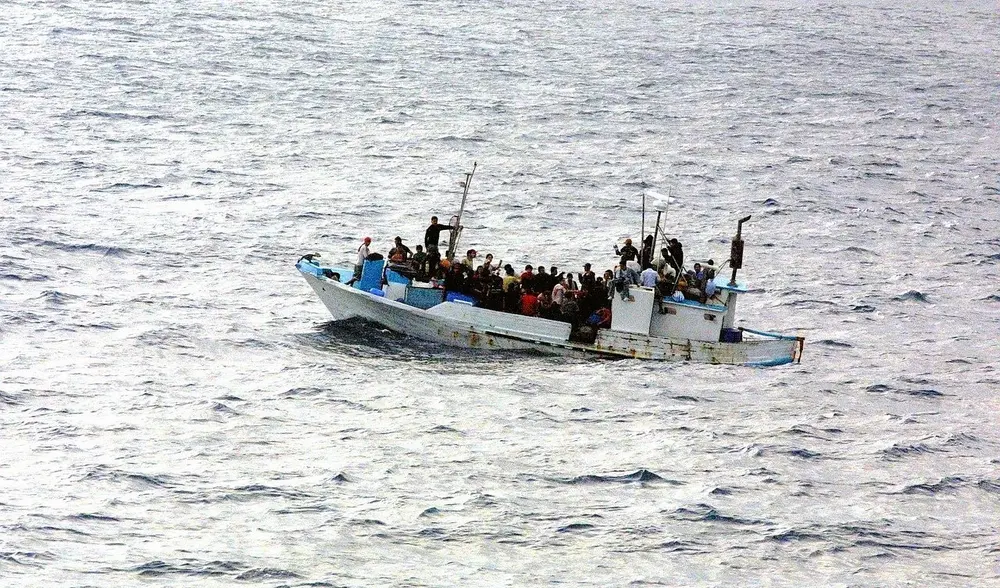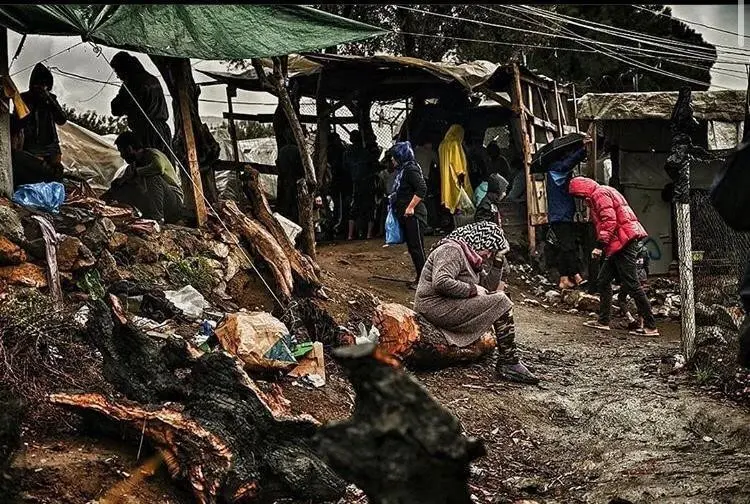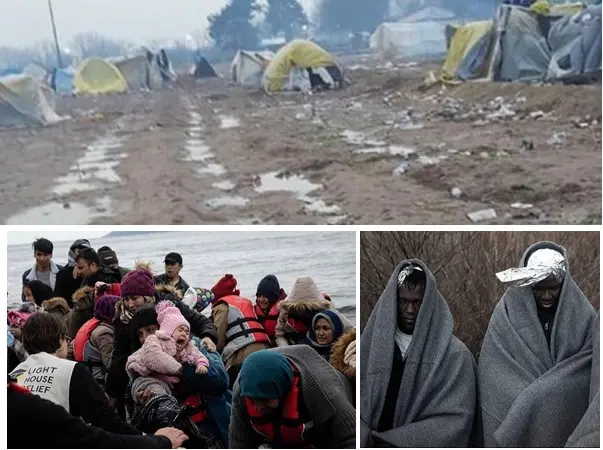A virus called “indifference” (Part 1/3)

In 2019, The Atlantic described Lesbo’s Moria refugee camp as a place “topped with spirals of razor wire, enclosing one of Europe’s most infamous holding pens for asylum seekers”. The piece was titled “Welcome to Europe. Now Go Home” and it represents the lives of those making grueling journeys to escape their cruel realities. The world is currently dealing with a new pandemic around the world, but along with other pandemics, indifference has been around and widespread just as long. While all attention is centered in the countries that are facing a current crisis with COVID-19 and all governments are doing “what they can” to protect lives, many others in extremely vulnerable situations have been left behind.
Moria camp was created to serve as a transition point with capacity to house 3.000 people; in November 2019 it was already hosting around 13.000 refugees, and nowadays it is estimated to have nearly 30.000. When asked about the current number of refugees in Moria, Valeriya Mlynikowski a German NGO volunteer in the region, answered the following: “It seems like accurate statistics are not available, but we would say around 27.000, the thing is that we can see people dying every day and also more boats arriving with people”.
The situation seems to have worsened at the end of last year, when the number of people crossing the Turkish border into Greece increased the total number of refugees in Moria. Moria’s refugees are mainly of Afghan origin, persecuted in Iran, and Syrians. Now with the outbreak of COVID-19, the outlook does not seem to improve and refugees can not catch a break in their constant battle to find better conditions in a Europe that now seems to have turned its back on them and left them behind.
Concern has appeared since sanitation in Moria is simply not possible. In some parts of the camp, there is only one water tap available for 1.300 people, who do not even have access to soap either (Al-Arshani, 2020). On top of that, other vital elements are lacking in the camp; people are facing medicine shortages and only have unreliable access to health care; food availability is decreasing since early this year, and while refugees wait for bread in long lines, paradoxically close to Moria tourists delighted themselves with the delicious Greek diet until late February. According to Harlan (2020), “conditions at the island camps have never been worse. Children shiver through the nights, bundled in wet blankets that never fully dry. There are protests, scabies outbreaks and fatal stabbings in middle-of-the-night fights”.
Among issues like undernourished mothers not even able to feed their newborns, several respiratory problems developed among the refugees. The most dreadful thing seen there are the psychological effects of the atrocities lived before their arrival and the new challenges refugees are facing now. These wounds will leave deep scars, especially on the children that stop playing, talking and looking to the horizon; some of them simply remain lying down without opening their eyes, motionless with something called “resignation syndrome”, caused by the loss of hope. Pregnant women are denied access to doctors, journalists are threatened with penalties or imprisonment if they do not leave the island immediately and refugees are exposed to aggressive racists attacks, as seen early March when right wing groups tried to attack the camp.
Finally, after the confirmation of positive cases of COVID-19 in the camp, it brings a new and possibly more dangerous threat, worsened by the lack of political will to solve a problem that has been instrumentalized for political purposes. People in Moria as any other human being, are just trying to survive and give their descendants a better future. So, what is the most lethal virus? COVID-19 or indifference?
References:
Al-Arshani, S. (2020, March 19). Photos from inside refugee camps show how they could be decimated by coronavirus. Business Insider. Retrieved from www.businessinsider.com/a-coronavirus-outbreak-could-leave-refugees-even-more-vulnerable-2020-3
Chapman, A. (2020, February 9). A doctor’s story: inside the ‘living hell’ of Moria refugee camp. The Guardian. Retrieved from www.theguardian.com/world/2020/feb/09/moria-refugee-camp-doctors-story-lesbos-greece
Donadio, R. (2019, November 15). Welcome to Europe. Now Go Home. The Atlantic. Retrieved from www.theatlantic.com/international/archive/2019/11/greeces-moria-refugee-camp-a-european-failure/601132/
Fallon, K., & Harriet, G. (2020, March 11). Lesbos coronavirus case sparks fears for refugee camp. The Guardian. Retrieved from www.theguardian.com/global-development/2020/mar/11/lesbos-coronavirus-case-sparks-fears-for-refugee-camp-moria
Harlan, C. (2020, February 23). Migrants wait in bread lines, while tourists dine on grilled octopus in Greece. The Washington Post. Retrieved from www.washingtonpost.com/world/2020/02/23/moria-refugee-camp-migrants-waiting/
Harriet, G. (2020, January 17). “Moria is a hell”: new arrivals describe life in a Greek refugee camp. The Guardian. Retrieved from www.theguardian.com/global-development/2020/jan/17/moria-is-a-hell-new-arrivals-describe-life-in-a-greek-refugee-camp
Montague, J. (2019, October 6). In Lesbos’s Moria camp, I see what happens when a child loses all hope. The Guardian. Retrieved from www.theguardian.com/commentisfree/2019/oct/06/moria-refugee-camp-lesbos-traumatised-children.
Schiessl, S., & Lyapina, A. (2020). Aufnehmen statt Abschotten! Retrieved March 27, 2020, from taz.de/Corona–Flucht/!170599/.
Socialist Worker. (2020, March 15). Lesvos—a hellhole for refugees created by racism. Socialist Worker. Retrieved from socialistworker.co.uk/art/49742/Lesvos+a+hellhole+for+refugees+created+by+racism
Authors:
Charlotte Lydia Bock: Charlotte has a Bachelor’s degree in Economic Science from the University of Stuttgart-Hohenheim. Her recent internships she completed at the research institute CINEP in Colombia and at GIZ’s Public-Private-Partnership department in Germany. Further work experience in development cooperation she gained with AIESEC in Indonesia.
Andrés Escobar: Andrés holds a Master’s degree in Administration from the University of Antioquia, a Bachelor’s degree in International Business from the University ESUMER as well as the Bachelor of Public Accounting from the University of Antioquia.
“The views represented in this opinion piece do not necessarily represent those of the Willy Brandt School of Public Policy.”
~ The views represented in this blog post do not necessarily represent those of the Brandt School. ~

